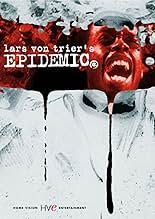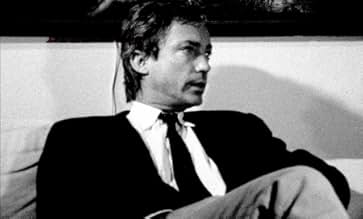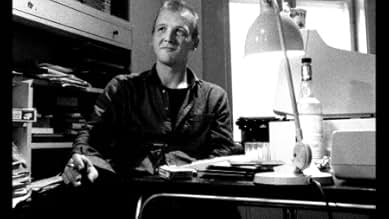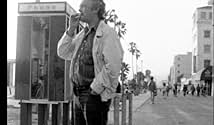AVALIAÇÃO DA IMDb
5,9/10
6,5 mil
SUA AVALIAÇÃO
Um diretor e roteirista escreve um roteiro e, no processo, a linha entre ficção e realidade fica tênue.Um diretor e roteirista escreve um roteiro e, no processo, a linha entre ficção e realidade fica tênue.Um diretor e roteirista escreve um roteiro e, no processo, a linha entre ficção e realidade fica tênue.
- Direção
- Roteiristas
- Artistas
- Prêmios
- 1 indicação no total
- Direção
- Roteiristas
- Elenco e equipe completos
- Produção, bilheteria e muito mais no IMDbPro
Avaliações em destaque
EPIDEMIC (Lars von Trier - Demark 1987).
Von Trier's second feature reveals his obsessions with cinema, with his self-imposed limitations on film-making in many ways foreshadowing Von Trier's later obstructions upon Jorgen Leth in THE FIVE OBSTRUCTIONS (2003).
Essentially a film about his own obsessions, or a grand parody on horror, as some suggested. Von, Trier, frustrated by the delay of his never realized project, "The Grand Mal", about two gangster families in divided Berlin, made a bet with film consultant Claes Kastholm of the Danish Film Institute, claiming that he could make a feature film for one million Danish kroner. Resulting partly in an amateur movie about a film director and a scriptwriter who must write a new manuscript in five days, interspersed with scenes from the film they are working on - about a young idealistic doctor in the late 20th century, who tries to fight an epidemic, but only manages to spread it further. The film culminates with the outbreak of a deadly plague, not in the past but in the present. Throughout the film, Von Trier shows his fascination with Germany, for example, during a ride through the "Ruhrgebiet", the industrial core of Europe, or the world, at least during the '80s.
Camera Obscura --- 8/10
Von Trier's second feature reveals his obsessions with cinema, with his self-imposed limitations on film-making in many ways foreshadowing Von Trier's later obstructions upon Jorgen Leth in THE FIVE OBSTRUCTIONS (2003).
Essentially a film about his own obsessions, or a grand parody on horror, as some suggested. Von, Trier, frustrated by the delay of his never realized project, "The Grand Mal", about two gangster families in divided Berlin, made a bet with film consultant Claes Kastholm of the Danish Film Institute, claiming that he could make a feature film for one million Danish kroner. Resulting partly in an amateur movie about a film director and a scriptwriter who must write a new manuscript in five days, interspersed with scenes from the film they are working on - about a young idealistic doctor in the late 20th century, who tries to fight an epidemic, but only manages to spread it further. The film culminates with the outbreak of a deadly plague, not in the past but in the present. Throughout the film, Von Trier shows his fascination with Germany, for example, during a ride through the "Ruhrgebiet", the industrial core of Europe, or the world, at least during the '80s.
Camera Obscura --- 8/10
Epidemic (1987), directed by Lars von Trier, is a meta-cinematic exploration of the blurred line between fiction and reality. The film follows a director and screenwriter who, while working on a script about a plague, find themselves caught up in a real-life epidemic, mirroring the events they are writing. This film is a challenging and unconventional piece of work, characteristic of von Trier's early style, marked by its fragmented narrative and philosophical underpinnings.
The performances are fittingly restrained, with Allan De Waal and Ole Ernst bringing a sense of detachment and intellectual depth to their characters, reflecting the film's thematic concerns. The film's low-budget aesthetic, with shaky handheld camerawork and raw sound design, serves to reinforce the sense of chaos and uncertainty that permeates the narrative. It's a deliberate stylistic choice that enhances the surreal, almost documentary-like atmosphere, but it may be off-putting to some viewers who prefer more polished filmmaking.
Von Trier's direction is methodical, and while the premise of the film offers intriguing possibilities, the execution can feel disjointed and unclear at times. The dialogue often veers into abstract territory, and the narrative structure is fragmented, leaving viewers to piece together the meaning behind the events. The film's slow pace, combined with its minimalistic style, can make it feel like a deliberately inaccessible work, challenging the audience's patience.
Epidemic is a film that operates on multiple levels, blending political, artistic, and existential commentary with a quasi-documentary style. While it offers some thought-provoking moments, it struggles to maintain coherence and impact over its runtime. It is best suited for those interested in avant-garde cinema or those looking to delve into the early works of Lars von Trier, but casual viewers may find it frustrating.
Rating: 6/10. A provocative, if uneven, exploration of the intersection between art, reality, and societal collapse.
The performances are fittingly restrained, with Allan De Waal and Ole Ernst bringing a sense of detachment and intellectual depth to their characters, reflecting the film's thematic concerns. The film's low-budget aesthetic, with shaky handheld camerawork and raw sound design, serves to reinforce the sense of chaos and uncertainty that permeates the narrative. It's a deliberate stylistic choice that enhances the surreal, almost documentary-like atmosphere, but it may be off-putting to some viewers who prefer more polished filmmaking.
Von Trier's direction is methodical, and while the premise of the film offers intriguing possibilities, the execution can feel disjointed and unclear at times. The dialogue often veers into abstract territory, and the narrative structure is fragmented, leaving viewers to piece together the meaning behind the events. The film's slow pace, combined with its minimalistic style, can make it feel like a deliberately inaccessible work, challenging the audience's patience.
Epidemic is a film that operates on multiple levels, blending political, artistic, and existential commentary with a quasi-documentary style. While it offers some thought-provoking moments, it struggles to maintain coherence and impact over its runtime. It is best suited for those interested in avant-garde cinema or those looking to delve into the early works of Lars von Trier, but casual viewers may find it frustrating.
Rating: 6/10. A provocative, if uneven, exploration of the intersection between art, reality, and societal collapse.
Look, I know a substantial proportion of the American population get a little hot under the collar when funny-talking foreigners start criticising the American government and way of life, but hey - when you're the only country in the world inclined to and capable of dictation of world policy, you gotta take it on the chin. While Von Trier even makes me wince sometimes (the end credits to Dogville for instance), it's his point of view and is worthy of thought. He isn't here to lick your derrière clean for you - if you can't take a little criticism of the homeland, I'd steer clear of any imported movies for a while. Anyhoo, when truly disrespectful films like Titanic break records and reap awards with nary a raised eyebrow, it's double standards to expect non-US films to walk the line you'd like. Von Trier is a genius film-maker... you may not agree with his politics, but you cannot doubt his talent.
The idea of the film is great. Mixing the creation of a movie and his viewing. It's done in a very ambitious way, incredibly sophisticated and elegant when we know the budget who was assigned to the movie.
A lot of scenes are incredible, specially the one who shows the contamination of the priest, adding a reflection on the condition of the black man. Obviously the last scene is one of the most incredible things I've seen on a screen, but we can doubt the mental health of Von Trier and his crew. However maybe it's the reason he's so good...
I didn't like a few things. I think there is too much time about the creation of the movie, a few ridiculous and unappropriated moments as the story of the American letters of Niels
A lot of scenes are incredible, specially the one who shows the contamination of the priest, adding a reflection on the condition of the black man. Obviously the last scene is one of the most incredible things I've seen on a screen, but we can doubt the mental health of Von Trier and his crew. However maybe it's the reason he's so good...
I didn't like a few things. I think there is too much time about the creation of the movie, a few ridiculous and unappropriated moments as the story of the American letters of Niels
"Epidemic" is, at its heart of hearts, a movie about making movies. As such it challenges the relation between fiction and reality. The two are not statically established realms, self contained in their clearly contained functional domains but they are dynamically interacting at all levels and at all times. The result is a movie in which the narrative structure is dual and of a meandering nature, climaxing in what could be a merge between a programmed project that involves human intellectual intervention- the movie within the movie- and the outbreak of a natural phenomenon with its catastrophic consequences- the epidemic.
Styllistically, "Epidemic" is very much a Lars Trier movie and it shows. From the apparently disconnected flow of scenes to mix of gritty realism with allegory, the director imprints his very personal mark in all elements of "Epidemic". Its very structure attests to this and the imagery reflects it in a very overt manner. "Epidemic" seems to be a playing ground of sorts in which Lars von Trier experiments as much as possible and in trying different things creates a diverse mismatch of scenes that not always work completely well together although they create an atmosphere.
As the process of coalescence between "fiction" and "reality" (this reality being, of course, fictional in itself which adds another layer of complexity and challenges the very notion of the third and fourth walls) heightens the narrative frame shrinks from the stage that is Europe to a small room. The claustrophobia of the later phase of the movie bring the full impact of the plague to the viewer's attention via a limited sample of the population that permits a personal experience of it all.
Much like Bergman's "The Seventh Seal", the plague in question is to be read on many levels and very much like the Swedish director's movie, "Epidemic" is not for everyone. Those who find it interesting, however, may have a strangely riveting experience upon watching this clearly unconventional movie that pushes many borders even if does not do so in a completely coherent manner.
Styllistically, "Epidemic" is very much a Lars Trier movie and it shows. From the apparently disconnected flow of scenes to mix of gritty realism with allegory, the director imprints his very personal mark in all elements of "Epidemic". Its very structure attests to this and the imagery reflects it in a very overt manner. "Epidemic" seems to be a playing ground of sorts in which Lars von Trier experiments as much as possible and in trying different things creates a diverse mismatch of scenes that not always work completely well together although they create an atmosphere.
As the process of coalescence between "fiction" and "reality" (this reality being, of course, fictional in itself which adds another layer of complexity and challenges the very notion of the third and fourth walls) heightens the narrative frame shrinks from the stage that is Europe to a small room. The claustrophobia of the later phase of the movie bring the full impact of the plague to the viewer's attention via a limited sample of the population that permits a personal experience of it all.
Much like Bergman's "The Seventh Seal", the plague in question is to be read on many levels and very much like the Swedish director's movie, "Epidemic" is not for everyone. Those who find it interesting, however, may have a strangely riveting experience upon watching this clearly unconventional movie that pushes many borders even if does not do so in a completely coherent manner.
Você sabia?
- CuriosidadesThe story Udo Kier's character Udo tells Lars and Niels, is actually the real story of Udo Kier's birth.
- Cenas durante ou pós-créditosThe film's title appears in red letters in the upper left corner of the screen for the entire length of the film.
- ConexõesFeatured in The Making of 'Europa' (1991)
- Trilhas sonorasTannhäuser (The Overture)
Composed by Richard Wagner
Principais escolhas
Faça login para avaliar e ver a lista de recomendações personalizadas
- How long is Epidemic?Fornecido pela Alexa
Detalhes
Bilheteria
- Faturamento bruto mundial
- US$ 938
- Tempo de duração
- 1 h 46 min(106 min)
- Cor
- Mixagem de som
- Proporção
- 1.66 : 1
Contribua para esta página
Sugerir uma alteração ou adicionar conteúdo ausente





















